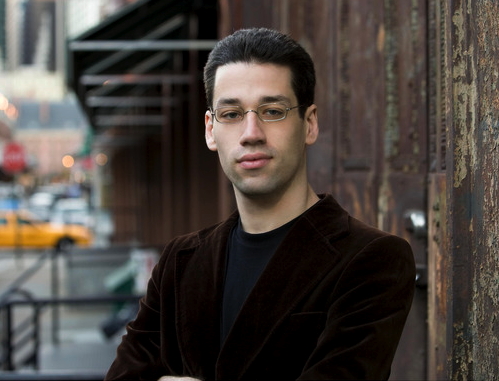Biss’s Schumann program short on fantasy and nuance

Jonathan Biss performed music of Schumann, Janacek and Berg Friday night at Jordan Hall. Photo: J. Katz
On Friday night at New England Conservatory’s Jordan Hall, pianist Jonathan Biss gave the audience something rare: an evening of character pieces without character.
Presented by Celebrity Series of Boston, the recital was one of several programs in a project titled “Schumann: Under the Influence,” which Biss has taken to major cities in Europe, the U.K., and the United States, with the aim of gaining more respect for this composer whose music is often misunderstood and whose influence on later composers is usually underestimated.
On Friday’s program, two of Schumann’s early piano cycles, the Fantasiestücke, Op. 12, and the Davidsbündlertänze, Op. 6, alternated with twentieth-century character pieces by Janáček (selections from On an Overgrown Path) and Berg’s intensely chromatic, post-Straussian Sonata, Op. 1. In fact, the Janáček selections were interleaved with corresponding movements of Schumann’s Op. 12, an interesting approach that ultimately felt more didactic than artistic.
Those of us who harbor an irrational affection for this prime exponent of musical subjectivity could only admire the way Biss got his message out through website, press release, and interview. He talked a great recital. But onstage Friday night, when the fingers met the keys, the message didn’t come through.
It seemed to, at first. To open the program, the melody of Schumann’s “Des Abends” (“Evening”) drifted down from heaven on Biss’s velvet touch, with broad yet natural rubato, and inner voices coming and going in the haze.
Three or four hazy, velvety, rubato-filled movements later, however, a realization began to dawn: This is all he’s got.
The up-tempo version of this approach was a kind of nervous, undifferentiated rush of notes, which was Biss’s interpretive answer to most of the pieces that came from what Schumann called his “Florestan” side—fast and furious, bristling with masculine energy.
It was in the Florestan pieces that Schumann found novel ways of writing athletically for the keyboard, often called “unpianistic” because they don’t fall easily under the fingers, and yet their distinctive patterns and sonorities greatly expanded the piano’s palette.
Biss handled the finger-twisting demands of these pieces with assurance, and when he was tuned in to the imaginative life of the piece, as in the fast staccato chords of the intriguingly-marked Sehr rasch (und in sich hinein), roughly “Very impetuous (and willful),” from Op. 6, the results were exhilarating. Too often, however, these distinctive pieces flew by in a blur.
As for Schumann’s other alter ego, Eusebius the dreamer, his pieces come in many shades too, which the composer helpfully indicates either with poetic titles as in Fantasiestücke or, in Davidsbündlertänze, by replacing the familiar “allegro” and “andante” tempo markings with German mood words like innig (intimate), zart (tender), and einfach (simple).
The distinctions among these terms are hard to make in prose or at the keyboard. But one can say that innig suggests something private being observed, zart carries the connotation (as in English “tender”) of sensitivity to pain, and einfach invites the player to drop sophisticated inflections for the moment and give us Schumann in one of his most characteristic guises, the child-man, the holy fool.
For the most part, Biss made the same gauzy atmosphere serve for all three, and much else besides. He gave the impression, surely untrue, of being more fascinated with himself as an aesthete than with the endless variety of Schumann’s colors and moods.
The Janáček pieces that the pianist matched with the Fantasiestücke did indeed sound like Schumann, or at least like Jonathan Biss playing Schumann. (One had the feeling that this pianist could make Rameau or Cole Porter sound like Schumann if he wanted.) The connection is legitimate: both composers were keeping intimate musical diaries at the piano, Janáček while struggling to create his operatic masterpiece, Jenůfa.
And the comparison was instructive: Janáček managed to out-Schumann Schumann for emotional volatility, as time after time a musical pot with seemingly no flame under it suddenly boiled over. And the occasional thickness of Janáček’s piano textures was a reminder that few of the composers whom Schumann inspired to write piano pieces achieved anything like his economy of notes.
Biss launched into the intricacies of Berg’s Sonata with considerable passion and assertiveness, but didn’t convey much sense of direction in the music. Berg’s first and lifelong love was the human voice, and a stronger singing tone than Biss had on Friday night would have given the piece more shape and definition.
For the same reason, the pianist’s suggestion (quoted in the program notes) that the Berg piece was the logical next step after Schumann’s late works was not demonstrated in the performance. The conclusions of both the Sonata and Davidsbündlertänze are, as Biss pointed out, capable of exquisite tenderness, but little of that came through in Friday night’s rather vague renderings.
Biss offered one of those late Schumann pieces—the very latest, in fact, the last of the five Gesänge der Frühe (Early Morning Songs). Op. 133—as an encore following Davidsbündlertänze. Relaxing a bit in the end zone, Biss succeeded in letting this wayward little piece just be itself, einfach.
Jonathan Biss continues “Schumann: Under the Influence” in concert with the Elias String Quartet at Jordan Hall 8 p.m., April 12. celebrityseries.org; (617) 482-6661.
Posted in Performances